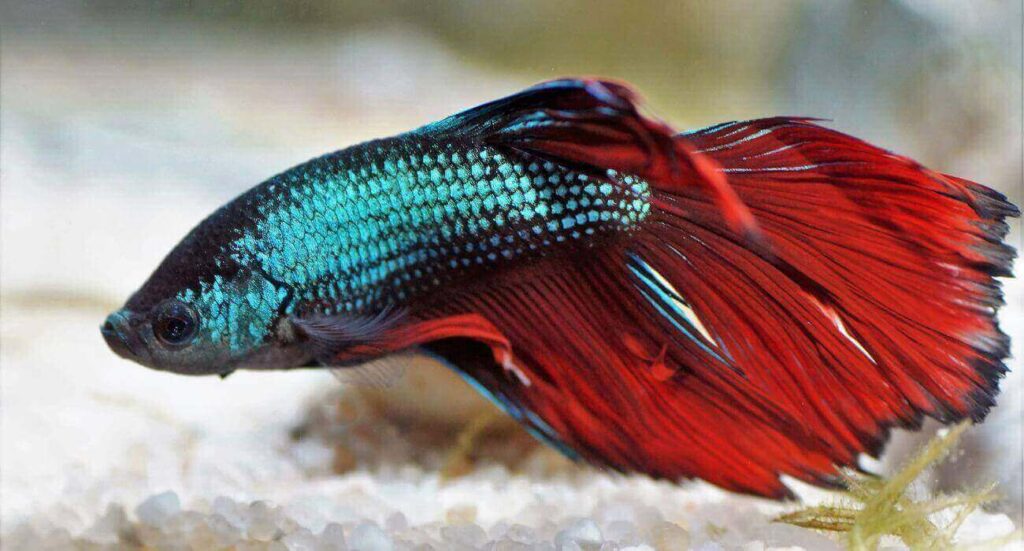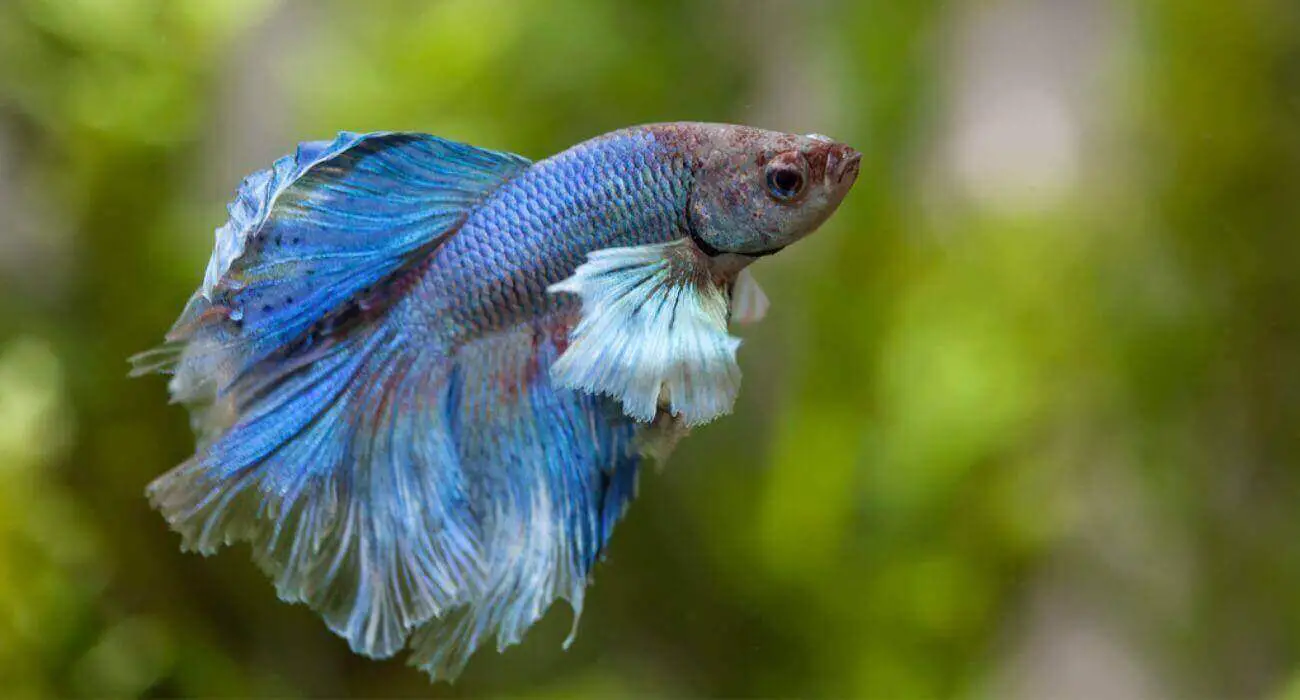As an Amazon Associate, I earn from qualifying purchases
Betta fish typically sleep for short periods throughout both day and night. Their sleep cycle is not continuous, summing up to a total of about 12-14 hours daily.
Betta fish, often known as Siamese fighting fish, require adequate rest like any other creature. Owners might notice them taking breaks during the day and settling down when the lights go out. Understanding the sleeping habits of betta fish is crucial for maintaining their health and well-being.
These vibrant fish do not have eyelids, so they rest by slowing down and staying relatively still, which could easily be mistaken for unusual behavior by inexperienced aquarists. Providing them with a comfortable aquarium environment that mimics their natural habitat increases the chances of a regular, healthy sleep pattern. Ideal conditions include a consistent light schedule, which helps regulate their sleep cycle, and plenty of hiding spots to offer a sense of security.
Betta Fish Sleep Patterns
Betta fish, with their radiant fins and vivid colors, aren’t just active swimmers; they need rest too. Let’s dive into how these aquatic jewels catch their Z’s under the water’s surface.
Do Betta Fish Sleep?
Betta fish do sleep, and much like humans, they have a natural sleep cycle. While it might seem surprising, these fish rest to recharge their energy and stay healthy. Betta fish typically choose nighttime for their slumber, aligning their patterns with the darkness of their environment.
Recognizing Sleep In Betta Fish
Spotting a sleeping betta isn’t always easy. Here are some signs:
- Immobility: Betta fish often stay completely still while sleeping.
- Location: They might sleep near the bottom of their tank, hidden among plants, or rest atop leaves.
- Posture: Some bettas lay on their side when they sleep, which can be alarming to unsuspecting owners.
To ensure your Betta gets quality sleep, create a comfortable habitat, with plants and hideaways, dim the lights in the evening, and keep noise to a minimum.
Betta Fish Sleep Duration

Betta Fish Sleep Duration is a topic that fascinates many betta owners. Understanding how long betta fish sleep helps you provide a healthier environment for your aquatic pet. Betta fish, like humans, have a natural sleep cycle. Knowing about their sleep behaviors assures you that your betta is resting enough.
Average Sleep Time For Betta Fish
Betta fish usually enjoy their sleep at night when it’s dark. The typical sleep duration for a betta fish ranges from 6 to 8 hours a night. This period is similar to the sleep needs of humans.
Factors Affecting Betta Sleep Length
Several elements can influence the length of time a betta fish sleeps. Each aspect can either shorten or extend their sleep. A balanced sleep schedule is crucial for their well-being.
- Lighting: Bettas tend to sleep more in complete darkness and less if there’s light.
- Environment: A calm tank environment promotes longer sleep, while a noisy one can cause stress and less sleep.
- Water Condition: Clean water and the right temperature encourage proper sleep cycles.
- Health: Healthy bettas usually follow a regular sleep pattern, while sick ones may sleep more or less.
- Age: Younger bettas might have shorter or more erratic sleeping patterns.
Understanding these factors helps ensure your betta fish gets the rest they need. By creating ideal conditions, you provide a nurturing habitat for your betta to thrive and rest well.
Betta Sleep Behaviors
Betta fish, also known as Siamese fighting fish, have unique slumber patterns that reflect their natural instincts and habitat. Observing these behaviors offers fascinating insights into their well-being.
Typical Sleeping Positions
Betta fish adopt several sleeping positions that might surprise their owners. Unlike humans, bettas do not have eyelids, so they can’t close their eyes. Instead, they find comfortable spots to rest. Let’s look at some of their preferred sleep positions:
- On their side: Betta fish may sleep lying on their side at the bottom of the tank, which is perfectly normal.
- Nestled in plants: They often seek shelter among leaves and aquatic plants, which provide a sense of security.
- At the water’s surface: Since bettas can breathe atmospheric air, they may rest near the surface to access oxygen easily.
- Inside decorations: To feel safe, bettas might sleep in tank decorations with holes or caves.
Nocturnal Vs. Diurnal Rest
| Nocturnal Rest | Diurnal Rest |
|---|---|
| Bettas are diurnal, therefore inactive at night. | They are active during the day, which is when they tend to rest sporadically. |
| Their lack of nighttime activity means they do not truly sleep in a nocturnal sense. | During the day, bettas take short naps to recharge. |
Understanding the difference between nocturnal and diurnal rest for bettas helps in creating an environment that supports their natural sleep cycle.
Environmental Influence
Like humans, betta fish need the right environment to get good sleep. Their surroundings play a big role in how well they rest. Lighting and their home setup are key factors. Let’s explore how these can affect your betta’s sleep.
Impact Of Lighting
Natural light tells a betta when it’s time to wake up or sleep. If the light is too bright or there too much, it can confuse them. Here’s what good lighting looks like:
- Low light during the night
- Regular dark periods mimic natural day cycles
- Use a timer for consistent light schedules
Keeping these points in mind helps bettas stick to a natural sleep rhythm. This is vital for their health.
Aquarium Setup And Sleep Quality
Their tank setup is just as important. Bettas need a comfy bed, so to speak. Here is what they prefer:
| Feature | Why It’s Important |
|---|---|
| Plants and Hiding Spots | It gives them a sense of security and a place to rest. |
| Calm Water | Too much flow can stress them out and keep them awake. |
| Correct Temperature | Too cold or too hot can disrupt their sleep. |
Creating the perfect home will encourage a betta to sleep well. It is crucial for their overall well-being.
Health And Sleep In Betta

Betta fish, also known as Siamese fighting fish, have unique sleep behaviors. Understanding their sleep patterns is key to ensuring they stay happy and healthy. Betta fish do sleep, and their rest is important for their overall wellbeing. Just like humans, each Betta has its own sleep schedule and preferences.
Sleep Disturbances As Health Indicators
Sleep disturbances in Betta fish can signal health issues. Keep an eye out for changes in their sleep habits. Unusual behavior, such as sleeping too much or too little, can indicate stress, illness, or poor water quality. Regular monitoring is crucial.
- Too much sleep: Might suggest low water temperatures or sickness.
- Little sleep: Could mean high stress levels or discomfort.
- Erratic sleeping: Suggests possible water contamination.
Promoting Restful Sleep For Betta Fish
Creating a peaceful environment is essential for Betta fish to sleep well. This involves setting a consistent day-night cycle and providing proper habitat conditions. Here’s how to promote restful sleep:
| Action | Benefit |
|---|---|
| Stable Water Temperature | Maintains comfort and health. |
| Dim Lighting at Night | Signals time to rest. |
| Quiet Surroundings | Reduces stress. |
| Enriched Environment | Encourages natural behavior. |
Consistency in daily routines helps Betta fish establish a healthy sleep cycle. Ensure their tank is free from disturbances during sleep hours. A stress-free Betta is a healthy Betta.
Myths About Betta Fish Sleep
Bettas, also known as Siamese fighting fish, have unique sleeping habits that often lead to misconceptions. Many betta fish owners question how their aquatic pets rest, with myths circulating about these behaviors. Unraveling these myths is crucial for understanding and caring for bettas properly.
Bettas Sleeping With Eyes Open
Betta fish lack eyelids, so they sleep with their eyes open. This trait can make it seem like they never sleep. Bettas do rest, but their open-eyed state can mislead owners into thinking they’re always awake. Recognizing a betta’s sleep involves observing a lack of movement and a resting position, often at the bottom of the tank or nestled in foliage.
Debunking Common Misconceptions
Myths cloud the truth about bettas and their rest patterns. Common fallacies include the idea bettas never sleep or can do so out of water. In reality, bettas require periods of rest just like any other fish and must be submerged in water to survive and sleep effectively. Understanding these facts promotes better welfare for betta fish.
Let’s dispel some myths:
- Bettas need darkness to sleep: While they can rest in low light, complete darkness is not a necessity.
- Bettas sleep at specific times: These fish may have rest periods throughout the day, not just at night.
- Bettas can sleep floating: If a betta is seen floating motionless, it may indicate stress or sickness, not sleep.
Recognizing how bettas sleep enhances the care provided to these beautiful fish. Keep accurate information in mind to ensure a healthy, serene environment for your betta.
Research Insights
Betta fish, with their vivid colors and elegant fins, lead a life of both activity and rest. Just like humans, these aquatic beauties need a good night’s sleep. But what do scientific insights reveal about the sleep patterns of Betta fish? Researchers have spent hours observing these fish to understand how long Betta fish sleep and what influences their sleep cycle.
Scientific Studies On Betta Sleep
Scientists have meticulously tracked the daily rhythms of Betta fish in various environments. Using infrared cameras and activity monitors, they have observed Betta fish in near darkness to mimic their natural habitat. Bold efforts to understand Betta sleep habits uncover surprising details.
- Bettas experience sleep at night, just like many other species.
- They prefer to rest on plant leaves or the tank bottom.
- Light cycles greatly affect their sleep duration.
| Study | Hours of Sleep | Conditions |
|---|---|---|
| Study A | 6-8 hours | Minimal light |
| Study B | Varies | Fluctuating light |
What Research Tells Us
Research lights the way to understanding Betta fish sleep patterns. Balancing the dark with the artificial, these studies reveal Bettas need about 6-8 hours of sleep. This sleep time mimics natural light cycles. Variations occur with changes in light, stressing the importance of a consistent environment.
- A stable day-night cycle promotes regular sleep.
- Bettas show reduced stress with better sleep.
- A proper tank setup can influence sleep quality.
Caring For Sleeping Betta

Caring for sleeping Betta fish is an essential aspect of maintaining their health and well-being. Betta fish, much like humans, require periods of rest to rejuvenate. While they don’t sleep in the same way we do, providing a comfortable habitat mimics their natural resting environment, promoting wellness and longevity.
Creating A Conducive Sleeping Environment
To ensure your Betta gets a good night’s sleep, focus on its tank conditions. A quiet, stable, and dark space encourages restful slumber.
- Dim the lights during night hours, replicating natural light cycles.
- Keep the water temperature at a consistent 76-81°F (24-27°C).
- Cover the tank to reduce disturbances and provide security.
- Provide hiding spots, like caves or plant leaves, for a sense of safety.
Best Practices For Betta Sleep Care
Maintaining a routine and monitoring tank conditions are paramount for your Betta’s health.
- Avoid abrupt changes in the tank that can startle the fish.
- Check the water quality regularly to prevent stress or illness.
- Maintain a feeding schedule that aligns with daylight hours.
- Observe your Betta’s behavior for signs of healthy sleep patterns.
Frequently Asked Questions On How Long Does Betta Fish Sleep
Do Betta Fish Sleep A Lot?
Betta fish do sleep, typically at night, but may take short naps during the day. Their sleep patterns can vary, often resting for shorter durations.
Do Betta Fish Need Darkness To Sleep?
Betta fish benefit from periods of darkness to maintain their natural sleep cycle. Similar to humans, a dark environment signals it’s time to rest.
Is My Betta Sleeping Or Sick?
To differentiate between a sleeping or sick betta, observe its behavior. Sleeping bettas often lay on their side at the bottom or in plants, and they should wake easily. Sick bettas might display lethargy, faded colors, or clamped fins and won’t respond promptly when disturbed.
How Do I Know If My Betta Fish Is Tired?
A tired betta fish may show less activity, rest more often, and have a decreased appetite. It can also display faded colors and might stay at the tank’s bottom or near surfaces.
How Much Sleep Do Betta Fish Need?
Betta fish typically require about 14 hours of sleep per day, similar to a nocturnal pattern.
Can Betta Fish Sleep With Lights On?
Betta fish prefer darkness for sleeping, and constant light can disrupt their sleep patterns and stress them.
What Signs Show A Sleeping Betta Fish?
A sleeping betta may float in place, lie on a leaf, or rest on the tank bottom, appearing very still.
Do Betta Fish Sleep At The Tank Bottom?
Yes, betta fish may sleep at the tank bottom or find a comfortable leaf or decoration to rest upon.
How Do I Ensure My Betta Fish Sleeps Well?
To ensure good sleep for your betta, provide a quiet environment, maintain a consistent light schedule, and include hiding spots.
Does A Betta Fish’s Sleep Change With Age?
As betta fish age, they may sleep more often or change their sleeping habits, just like humans and other animals.
Conclusion
Understanding betta fish sleep patterns is key to ensuring their health and well-being. These colorful creatures require periods of rest, much like humans do. By providing a tranquil environment and monitoring their behavior, you can help promote a natural sleep cycle for your betta.
Remember, a rested betta is a happy and vibrant addition to your aquatic family.
As an Amazon Associate, I earn from qualifying purchases

